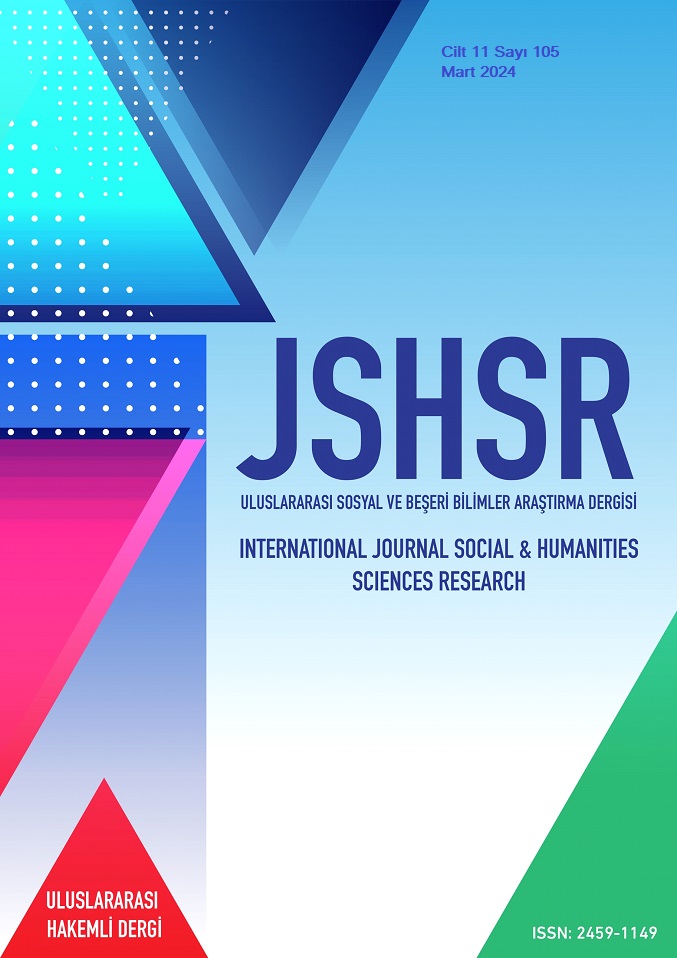Social Studies Education Graduate Students’ Tendencies of Thesis Topic Determination
DOI:
https://doi.org/10.5281/zenodo.10926553Keywords:
Graduate Student, Social Studies Education, Thesis Topic, TendencyAbstract
In current study, it is aimed to explore the thesis topic determination tendencies of social studies education graduate students. In line with this purpose, answers were sought to the questions of what are the opinions of social studies graduate students about the target group, method and the type of subject they want to work on in order to determine the thesis topic. The research was carried out using the basic qualitative research design, which is one of the qualitative research types. Convenience sampling method was used to determine the study group. Convenience sampling method is determined according to the convenience of opportunities such as time, place, and budget in reaching the study group. Data collected by semi-structed interview form which was developed by researchers. The data were collected face-to-face and online from postgraduate social studies students studying at different state universities. Content analysis was used in the analysis of the data. While determining the thesis topic, the participants will determine the characteristics of the sample, the characteristics of the research method they will use, the purpose of the research, the characteristics of the methods and techniques they will use in their research, and the research method. He selected and took into account the studies in the field by making use of similar studies in the literature from the acquisition skills and values in the social studies curriculum. It was concluded that they determined the best method they could serve and determined them according to the target audience they chose. In addition, when the thesis topics that the participants are working on are related to innovations in the field, they are usually related to digital issues and technology-based teaching; When the factors that are effective in determining the subject of the thesis, they are working on are examined, it is concluded that the interests and abilities of the participants and the influence of the consultant are more intense than the other factors.
References
Akbulut, H. İ., Çepni, S., & Şahin, Ç. (2013). Doktora tez sürecinde karşılaşılan problemlerin belirlenmesi: Eğitim fakültesi örneği. Dicle Üniversitesi Ziya Gökalp Eğitim Fakültesi Dergisi, (20), 50-69.
Aktürk, A. O., Şahin, İ., & Sünbül, A. M. (2008). Bilgisayar öğretmen adaylarının web temelli öğretim hakkındaki görüşleri. VIII. Uluslararası Eğitim Teknolojileri Konferansı.
Bahçeci, F., & Uşengül, L. (2018). Yüksek lisans ve doktora öğrencilerinin tez konusu belirleme kriterlerinin incelenmesi. Turkish Journal of Educational Studies, 5(2), 85-96.
Bakioğlu, A., & Gürdal, A. (2001). Lisansüstü tezlerde danışman ve öğrencilerin rol algıları: Yönetim için göstergeler. Hacettepe Üniversitesi Eğitim Fakültesi Dergisi, 21(21), 9-18.
Bozan, M. (2012). Lisansüstü eğitimde nitelik arayışları. Sosyal ve Beşerî Bilimler Dergisi, 4(2), 177-187.
Canbulat, T., Avcı, G., & Sipahi, S. (2016). ABD ve Kanada’ da sosyal bilgiler eğitimi alanındaki tezlerin değerlendirilmesi. Ahi Evran Üniversitesi Kırşehir Eğitim Fakültesi Dergisi, 17(2), 351-370.
Creswell, J. W. (2017). Educational research: Planning, conducting and evaluating quantitative and qualitative research. Pearson.
Çıkrıkçı-Demirtaşlı, N. (2002). Lisansüstü eğitim programlarına girişte lisansüstü eğitimi giriş sınavı (LES) sonucunun ve diğer ölçütlerin kullanımına ilişkin bir tarama. Ankara Üniversitesi Eğitim Bilimleri Fakültesi Dergisi, 35(1-2), 61-70. https://doi.org/10.1501/Egifak_0000000064
Dilci, T. (2019). Eğitim bilimleri örnekleminde lisansüstü eğitimin niteliksel boyutuna ilişkin görüşler (nitel bir çalışma). Fırat Üniversitesi Sosyal Bilimler Dergisi, 29(1), 159-179. https://doi.org/ 10.18069/firatsbed.538667
Dilek, A., Baysan, S., & Öztürk, A. A. (2018). Türkiye'de sosyal bilgiler eğitimi üzerine yapılan yüksek lisans tezleri: Bir içerik analizi çalışması. Turkiye Sosyal Araştırmalar Dergisi, 22(2), 581-602.
Geçit, Y., & Kartal, A. (2010, Kasım). Türkiye’deki sosyal bilgiler eğitimi araştırma konuları üzerine bir inceleme. In International Conference on New Trends in Education and Their Implications (Vol. 11, p. 13).
Gürbüz, S., & Şahin, F. (2014). Sosyal bilimlerde araştırma yöntemleri. Seçkin.
Haçat, S. O., & Demir, F. B. (2018). Sosyal bilgiler eğitimi üzerine yapılan doktora tezlerinin değerlendirilmesi (2002-2018). Avrasya Uluslararası Araştırmalar Dergisi, 6(15), 948-973. https://doi.org/10.33692/avrasyad.510136
Karakütük, K. (2009). Türkiye lisansüstü öğretim sistemi. Kasım Karakütük (Ed.). Lisansüstü öğretim sistemleri içinde (s.521-545). Pegem.
Karaman, S., & Bakırcı, F. (2010). Türkiye’de lisansüstü eğitim: Sorunlar ve çözüm önerileri. Sosyal Bilimler Araştırmaları Dergisi, 5(2), 94-114.
Kiley, M. (2009). Identifying threshold concepts and proposing strategies to support doctoral candidates. Innovations in Education and Teaching International, 46(3), 293-304. https://doi.org/ 10.1080/14703290903069001
McMillan, J. H., & Schumacher, S. (2010). Research in education: Evidence-Based ınquiry, myeducationlab series. Pearson.
Merriam, S. B. (2013). Nitel araştırma. Desen ve uygulama için bir rehber. (Çev. Editörü: Selahattin Turan). Nobel Akademik Yayıncılık.
Oruç, Ş., & Ulusoy, K. (2008). Sosyal bilgiler öğretimi alanında yapılan tez çalışmaları. Selçuk Üniversitesi Ahmet Keleşoğlu Eğitim Fakültesi Dergisi, 26(2008), 121-132.
Öner, G., & Öner, D. (2017). Sosyal bilgiler eğitiminde coğrafya konuları üzerine yapılmış lisansüstü tezlere yönelik bir analiz ve bibliyografya çalışması. Boğaziçi Üniversitesi Eğitim Dergisi, 34(2), 13-34.
Patton, M. Q. (2014). Qualitative research & evaluation methods: Integrating theory and practice. Sage Publications.
Sezer, A., İnel, Y., & Gökalp, A. (2020). Çalışma grubu sosyal bilgiler öğretmenleri olan Türkiye’deki lisansüstü tezlerin incelenmesi. Uşak Üniversitesi Sosyal Bilimler Dergisi, 12(2), 1-17.
Şahin, M., Göğebakan-Yıldız, D., & Duman, R. (2011). Türkiye’deki sosyal bilgiler eğitimi tezleri üzerine bir değerlendirme. Sosyal Bilgiler Eğitimi Araştırmaları Dergisi, 2(2), 96-121.
Tonbul, Y. (2017). Sosyal bilimler enstitülerinin lisansüstü eğitimin niteliğini artırmadaki rolü. Yükseköğretim ve Bilim Dergisi, (1), 150-162.
Toprak, M., & Erdoğan, A. (2013). Lisansüstü eğitimde Avrupa yaklaşımı. VI. Ulusal Lisansüstü Eğitim Sempozyumu, Bildiriler Kitabı, Sakarya, Türkiye.
Yıldırım, A. & Şimşek, H. (2013). Sosyal bilimlerde nitel araştırma yöntemleri (9. Baskı). Seçkin Yayıncılık.
Yüksek Öğretim Kurulu Başkanlığı Tez Merkezi (2022). Sosyal bilgiler tezleri. https://tez.yok.gov.tr/UlusalTezMerkezi/tezSorguSonucYeni.jspf
Downloads
Published
How to Cite
Issue
Section
License
Copyright (c) 2024 INTERNATIONAL JOURNAL OF SOCIAL HUMANITIES SCIENCES RESEARCH

This work is licensed under a Creative Commons Attribution 4.0 International License.


